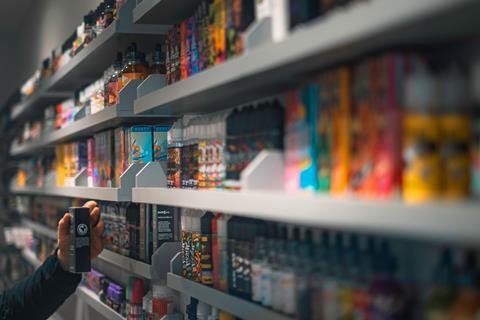Mary Deller, from Christian drug education charity Hope UK, outlines the key issues around vaping and the risks for young people

Parents who took part in a survey about vaping conducted by Hope UK at this summer’s New Wine festival, shared their concerns about their lack of knowledge, saying they would like their churches to provide more support to young people to raise awareness of the risks of vaping.
It’s an issue that’s frequently in our media headlines. At the start of this new school year, secondary head teachers across the UK spoke out about the measures they were having to take to prevent students from vaping in school. Medical experts have raised their concerns about young people who have become addicted to nicotine. In response to urgent calls for action, the UK government is currently looking at ways of restricting marketing, access and use by children, with a possible ban on single-use vapes in the pipeline.
So how bad is the situation with young people and vaping? The good news is that the majority of teenagers in the UK are not vaping – however, all the statistics paint a worrying picture, clearly showing that trends are going in the wrong direction. Since 2021 the proportion of children currently vaping has been greater than those currently smoking - 7.6% compared to 3.6% and nearly half of all young people who try vaping are non-smokers. [Action on Smoking and Health report 2023] ONS data published last month shows that those aged 16-24 are now the highest consumers of vapes, with over one in ten vaping daily or occasionally.
Hope UK’s work with pupils in primary schools reveals that children are very aware of vaping, to the extent that it is normalised – they may have parents, older siblings or friends who vape, or notice young people vaping on their way to school. Young people are confronted by row upon row of attractive looking vape products displayed openly in shop windows along every high street. The public health messaging around vaping being 95% less harmful than smoking has hit home but experts are now saying that this message has backfired, as many, in particular young people, believe that vaping is more or less risk-free.
Understanding the risks
What should parents know about vaping and what are the key messages they should be sharing with their children?
Perhaps the most important message to communicate is that vaping is not risk-free. Vapes (or e-cigarettes) were invented about 15 years ago to help smokers – they do not contain the carcinogenic chemicals present in tobacco smoke, so they are less harmful. Crucially, most vapes contain nicotine, the ‘drug’ in tobacco smoke, that enables smokers to satisfy their nicotine craving without introducing all the cancer-causing substances into their lungs. Vapes were never intended for non-smokers. The liquid contained within a device contains other chemicals – vegetable glycerin and propylene glycol, which help to create the vapour cloud and carry the flavourings (yet more chemicals) that have become so popular with young people.
The short-term potential effects of inhaling these substances directly into the lungs are now well known. They include a worsening of pre-existing lung conditions, such as asthma and inflammation of the respiratory tract. Another big problem is nicotine addiction. One of the most addictive drugs out there, the consequences are serious for teenagers with developing brains. Parents, teachers, doctors and young people themselves are reporting that nicotine addiction is having an adverse effect on schooling, mental health and physical wellbeing.
The big unknown is the long-term effect of vaping. Scientists say we will have to wait at least 20 or 30 years to know the answer to that question. In our drug awareness sessions we ask children and young people what they think of the idea that they are effectively human guinea pigs. No-one knows what the long-term health risks are, so scientists will be watching closely what happens to this current generation of vapers as they grow older. This isn’t something they have thought about before and not surprisingly it’s an unappealing suggestion.
The most popular vapes on the market are the single-use disposable brands – Elfbar is one of the best-known. Available in a mouth-watering range of colours, flavours and even fragrances, it’s hard to argue that they are not designed to entice young people, despite manufacturers’ protestations that many adults enjoy flavourings such as bubble gum or banana milkshake. Young people are buying them from their local shops despite an age restriction of 18 under UK law on buying and selling e-cigarettes. At just £5 for a single vape they are well within the reach of many teenagers.
Not only are shops selling to minors, they are the main source for illegal vapes that often contain nicotine in greater concentrations than the 2% strength permitted in legal products sold in the UK. Dangerous heavy metals and chemicals known to cause cancers, brain damage and organ damage, have been found in illegal vapes. Over two and a half million illicit devices have been seized by police and trading standards across the UK since the start of 2020 and experts warn that this is just the tip of the iceberg with illegal products flooding into the country.
There are also environmental hazards, with around five million single-use vapes being thrown away each week. The lithium contained in the batteries is thought to be sufficient to power 5,000 electric car batteries a year, not to mention the plastic waste and other chemicals within the devices.
Education is a key tool
Educating our young people, together with their parents, carers, youth workers and teachers is one of the most important tools we have to tackle the problem and prevent more children from taking up the habit. Hope UK works with churches, schools and other community groups, delivering in-person drug awareness workshops. Our sessions for children and young people have a focus on developing life skills that are essential to making healthy, drug-free choices.
Free online resources via Hope UK’s website include an e-learning module on vaping. Schools can register to receive a full suite of lesson plans for all key stages, mapped to the PSHE national curriculum. Hope UK also hosts regular online training for parents and youth workers throughout the year.
Find out more about what Hope UK can offer you
Visit www.hopeuk.org for more information.
Book your place on ‘Vaping - what parents need to know’ on 25 January 2024 at www.hopeuk.org/events Premiernexgen readers are offered a discount code when they book a place – quote ‘Premier24’.
































